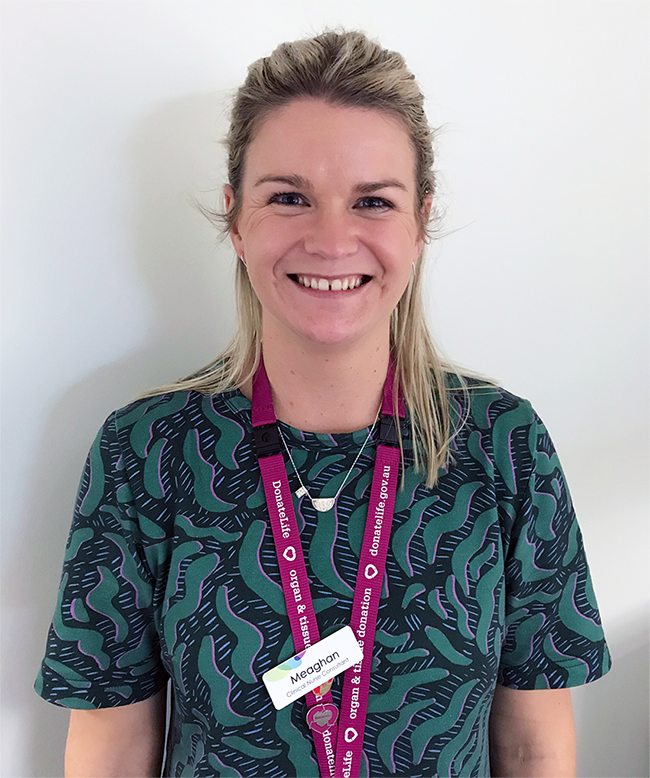It’s more important than ever to register to become an organ and tissue donor with COVID-19 causing a drop in the number of donors, transplants and registrations.
Meaghan Bruns, (pictured) a DonateLife Donation Specialist Nursing Coordinator (DSNC) at Western Health shares the challenges and rewards of her invaluable and often invisible role  in helping give people a second chance of life.
in helping give people a second chance of life.
A patient I’ll never forget
“I vividly remember the first patient who I cared for in the Emergency Department (ED) who went on to become an organ donor.
He was a teenager who had been assaulted in Melbourne CBD.
It was clear from the very beginning that he wasn’t going to survive.
I recall the intensive care team came down to ED to do their assessment and they mentioned that he may be suitable candidate for an organ donation.
His family arrived from overseas and gave their consent for their son to become a donor.
He was so young and his donation gave so many people a second chance of life. I still remember him to this day.”
Playing a part in saving lives is incredible
“In this role, I feel so lucky to talk to the most generous and loving people, often on the worst day of their life.
When I started in this role I remember someone told me that it was the donor family’s loss and grief, not mine. I remind myself of that often.
Sometimes there is a donor’s family that really pulls at your heartstrings.
I have cried in front of a family once, but you learn to deal with it.
Like most health professionals, you know you are there with a job to do and having that strong sense of purpose helps.
I am inspired by the families’ motivation to fulfil their loved ones wishes and knowing that I have played a small part in help up to seven people get a second chance of life is incredible.”
People don’t know we exist or what we do
“Most people think that we are there to have consent conversations with bereaved families, helping to answer their organ donation questions and make the decision that is right for them.
We do that, but there is a lot of invisible work that goes on behind the scenes to ensure a donation results in transplantation.
Even though I’m based at Western Health, I’m part of a state-wide service, so I travel to other metropolitan hospitals and regional areas to support families and hospitals with organ and tissue donation.
If a family consents to organ and tissue donation, we often become ‘detectives’, carrying out a risk assessment on the patient. We sensitively work with the families to understand their loved one’s medical and social history, which can also involve contacting their GP to ensure they are suitable candidates for donation.
We also work with Intensive Care Unit (ICU) staff, educating nurses and doctors on the best care to optimise the patient for donation.
A lot of my time is spent on the phone and in front of the computer with logistics and data collection — a single donation can involve anywhere between 50-100 phone calls.”
Covid-19 caused profound challenges
“Once we determine what organs the patient may be suitable to donate, we start discussions with the relevant transplant units and donor hospital theatre to book in a theatre time for the donation operation. As we often offer organs interstate and to New Zealand, a large part of our role involves coordinating logistics, ensuring an organ reaches the recipient as quickly as possible.
It has become even more complicated during the pandemic because of travel restrictions between states. For instance, if the donor dies from circulatory death (DCD), St Vincent’s Hospital in NSW is the only health service to transplant DCD donor hearts, so their surgeons would need to travel to Victoria to perform the organ donation operation. There used to be half hourly flights from Melbourne to Sydney and all of a sudden there is one or two a day.
Then there was the temporary suspension of the kidney and pancreas transplant programs in 2020.”
Impact on grieving families
“Covid 19 has also raised some other challenges. Due to the public health restrictions, visitors were restricted to the hospital. Many families were not allowed to see their loved ones until they transitioned to end of life care. I cannot comprehend how that would feel. It must have had a profound impact on many families who lost loved ones.”
Organ transplants, donors and registrations declined
“The pandemic has also had direct impact on organ and tissue donation. In 2020 there was a 12 per cent decrease in people receiving a transplant, compared with 2019. There were also 16 per cent decreases in donors and in Australians registering to become donors.
At Western Health in 2020, we had five donors who provided lifesaving transplants to 13 recipients.
There were also seven tissue donors, which can range from donating heart valves to children who have congenital heart malformations to donating corneas to restore sight.
We are so grateful to the donors and their families.
I’d encourage everyone to register to become an organ and tissue donor and to have a conversation with their family, who will ultimately make the final decision on whether the donation proceeds. More than 1,800 Australians waiting for an organ transplant, so we need as many to register as possible.”
Register to become an organ and tissue donor: donatelife.gov.au/register
